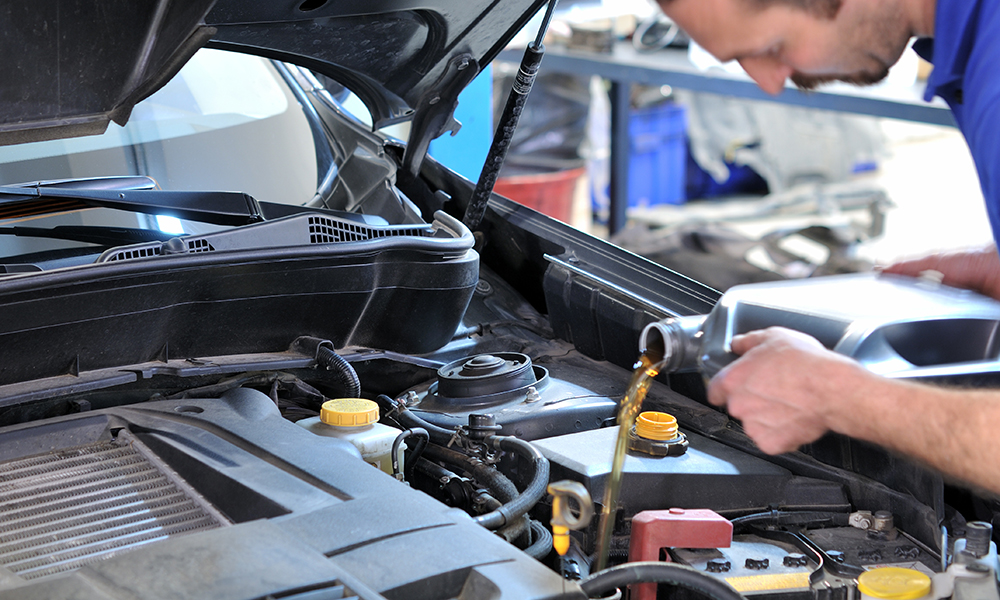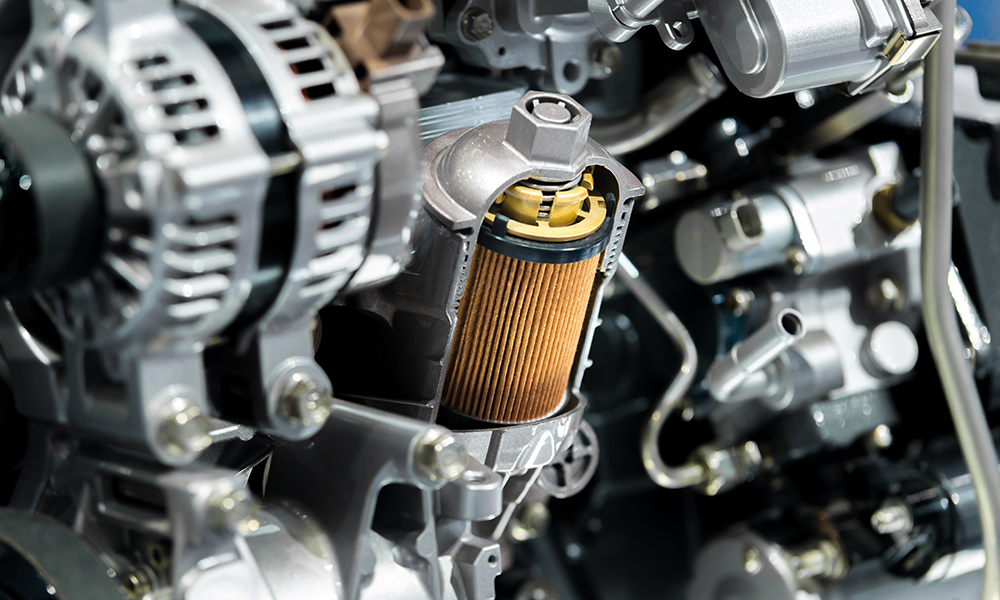The Importance of an Oil and Filter Change

Maintaining your vehicle means tending to tasks both big and small. However, during the hustle and bustle of everyday life, it’s easy for the significance of routine maintenance to slip through the cracks.
Oil and filter maintenance is often something that gets put on the backburner, compared to something like a flat tyre. After all, out of sight out of mind!
However, this is one step you don’t want to skip. Your engine needs to run like a well-oiled machine – literally. Sometimes, the only thing that’s preventing your engine’s components from grinding together is the oil, so it’s not great that it often gets left unattended. Here’s why engine oil changes, while a small part of the maintenance routine, shouldn’t be ignored.
The Purpose of Your Engine Oil and Filter
Oil
Let’s dive into the basics: engine oil. Its main role? To keep your engine’s moving parts…moving! It reduces heat and friction and keeps everything gliding smoothly, no judders, shudders or grinding.
Your engine needs a significant amount of clean oil to function properly. Besides lubrication, oil also helps cool your engine. Each time your engine revs up, it generates heat, but with clean oil, you can maintain the right temperature. The engine’s oil pump circulates oil throughout the engine, transferring heat to cooler areas.
Plus, oil does more than manage heat – it also fights against corrosion, keeping your engine parts in excellent condition. By preventing regular buildups of excess heat, oil helps avoid potential engine damage.
Filter
Now, let’s talk about the filter. Though small, it plays a crucial role in maintaining your car. Its job is to catch all the gunk and grime that tries to sneak into your engine. Without a fresh oil filter, these contaminants can wreak havoc, clogging your engine and reducing the amount of oil that can pass through. And as we know, your engine needs oil to function properly.
It’s a chain reaction – without a clean filter, you won’t get clean oil. Regular filter changes keep things clean, healthy, and running smoothly.
Frequency Matters: How Often Should You Change Your Oil?
Gone are the days of changing your oil every 3,000 miles. Thanks to advancements in lubricants, most engines now boast recommended intervals ranging from 5,000 to 10,000 miles.
It’s all about staying proactive. Typically, when you hit the 10,000km mark, that will be the point to change your oil and filter. By sticking to this schedule, you’ll reduce your chances of engine-related headaches in the future.
So, don’t sweat the small stuff – just stick to your routine. Luckily, with annual full car servicing, an engine oil and filter change will be included as part of it.
Signs Your Vehicle Needs an Oil Change
Although you can just stick to the regular intervals, your car will probably drop a few hints when it’s feeling ready for an oil change. Here are some telltale signs to keep an eye out for:
- Check Engine Light: One of the most obvious indicators is the illuminated check engine light on your dashboard. While it could signal various issues, a common culprit is low oil levels or dirty oil in need of a change.
- Dark, Dirty Oil: Take a peek under the hood and pull out the dipstick. Clean oil should have a golden hue, but if it’s turned dark and gritty, it’s time for a change.
- Engine Noise: Is your engine suddenly sounding louder than usual, like it’s working overtime? That could be a sign of inadequate lubrication, signalling it’s time for an oil refresh.
- Exhaust Smoke: Keep an eye on your tailpipe – excessive smoke, particularly if it’s blue or grey, could indicate burning oil, a symptom of oil that’s past its prime.
- Oil Smell Inside the Car: If you catch a whiff of oil inside your car, it could mean there’s a leak or oil is burning in the engine, both of which warrant immediate attention.
- Decreased Performance: Sluggish acceleration or a drop in fuel efficiency could be linked to dirty or insufficient oil, as it struggles to keep engine components running smoothly. This can be caused by a clogged filter.
By staying attuned to these signs and staying proactive with your oil changes, you’ll keep your engine working smoothly, and hopefully, avoiding costly repairs down the road.

The Importance of Oil Changes: What are the Benefits?
The benefits of regular oil changes are far reaching, so it’s important to make sure it’s not something that slips your mind.
Enhanced Performance and Efficiency
You’ve got places to go and things to do, and your car’s performance plays a crucial role in getting you there. Luckily, a simple oil and filter change can work wonders for keeping your car running smoothly.
Clean oil is vital for your engine’s operation, ensuring everything runs seamlessly. Proper lubrication eliminates friction and grinding, allowing components to work together efficiently. Old, dirty oil, on the other hand, can clog the engine and lead to sluggish performance and decreased efficiency.
Your engine contains many key components that require oil for lubrication, including the camshaft, crankshaft, and pistons inside the engine cylinder. To ensure these parts function properly, you need clean oil circulating through your engine. Neglecting this can damage components and negatively impact fuel efficiency, emissions, and overall performance.
Each oil change helps refresh your engine and unlock its full potential. Oil reduces friction on all components, leading to smoother operation and better fuel efficiency. It’s like giving your car a breath of fresh air – an engine with less friction achieves optimum performance and mileage with reduced stress.
Keeps Your Engine Clean
By this point, you already know how important your engine is to your vehicle’s overall performance. So that’s why it’s so important to keep it clean for its longevity. And regular oil and filter changes play a crucial role in achieving just that. As your engine operates, it naturally accumulates residue and contaminants, which can hinder its performance over time.
Your oil filter collects any residue and grime, so it’s vital to remove the old oil and replace the filter to avoid additional buildup. This vital maintenance task not only keeps your engine running well, but it can also extend its lifespan.
Lower emissions to protect the environment
In today’s climate-conscious world, emissions are under the spotlight, and your car’s role is no exception. During your MOT, every hydrocarbon released from your exhaust is scrutinised – and old, dirty oil can tip the scales unfavourably.
Dirty oil equals more hydrocarbons, which means a higher emission score. As part of an emissions test, they determine how many hydrocarbons are released from your exhaust into the atmosphere. Old, dirty oil causes a build up of hydrocarbons which causes more of these particles resulting in a higher emission score.
But fear not – a simple fix is at hand. By staying on top of your oil and filter changes, you’re not just keeping your engine healthy; you’re also doing your part for the environment. Fresh oil and a clean filter mean fewer contaminants, less pollution, and a brighter future for our planet.
Save Money
Let’s break it down: when your car doesn’t get the fresh oil it needs, it ends up guzzling more oil than it should. That’s not just bad news for your engine; it’s bad news for your bank account. Plus, let’s not forget about the fuel – inefficient engines burn through more fuel, costing you even more at the pump.
Without fresh oil and a new filter, you’re inviting trouble in the form of costly repairs down the road. Think of it as a domino effect – neglecting one small task now can lead to a cascade of expenses later on.
Do You Get an Oil and Filter Change With a Service?
The contents of your service package can vary depending on the type you opt for. However, if you’re getting a full-service treatment, chances are an engine oil and filter change will be on the cards.
So, whether you’re due for a full overhaul or a quick tune-up, make sure to clarify what’s included in your service package. After all, a well-maintained engine is the key to a smooth ride ahead.
Keeping Your Engine Running Smoothly
From the importance of oil and filter changes to the benefits they bring, you’re now armed with the knowledge to keep your engine running smoothly for miles to come.
By sticking to a regular oil and filter maintenance schedule, you’re not just prolonging your engine’s life – you’re also maximising performance, efficiency, and even doing your part for the environment.


